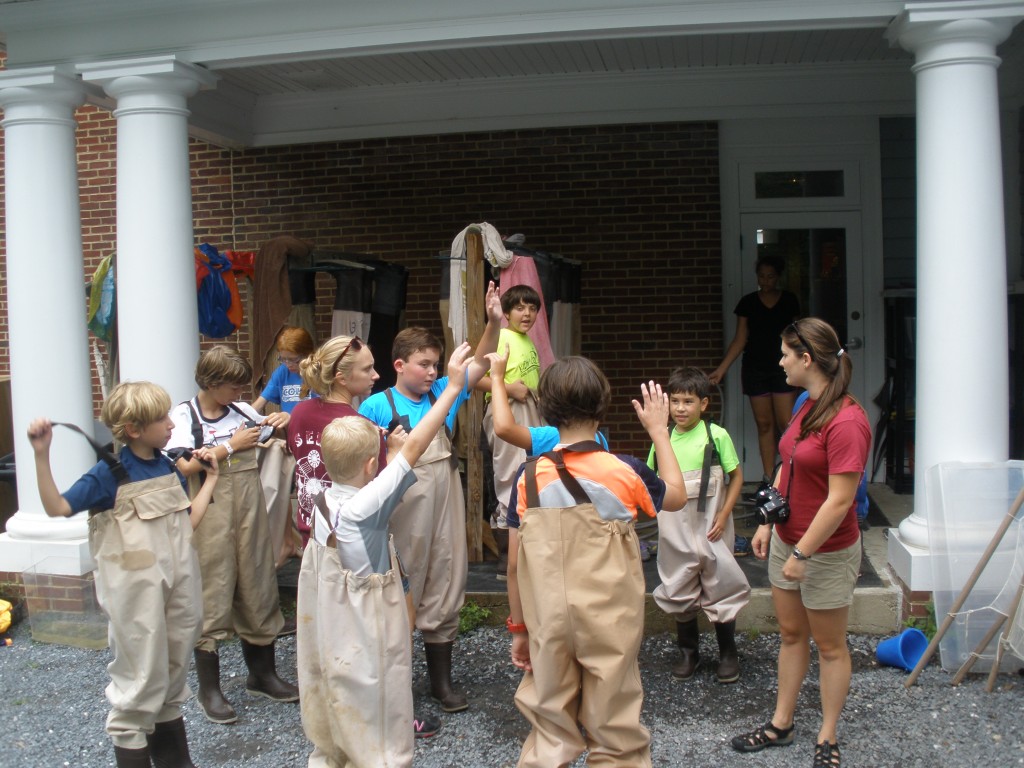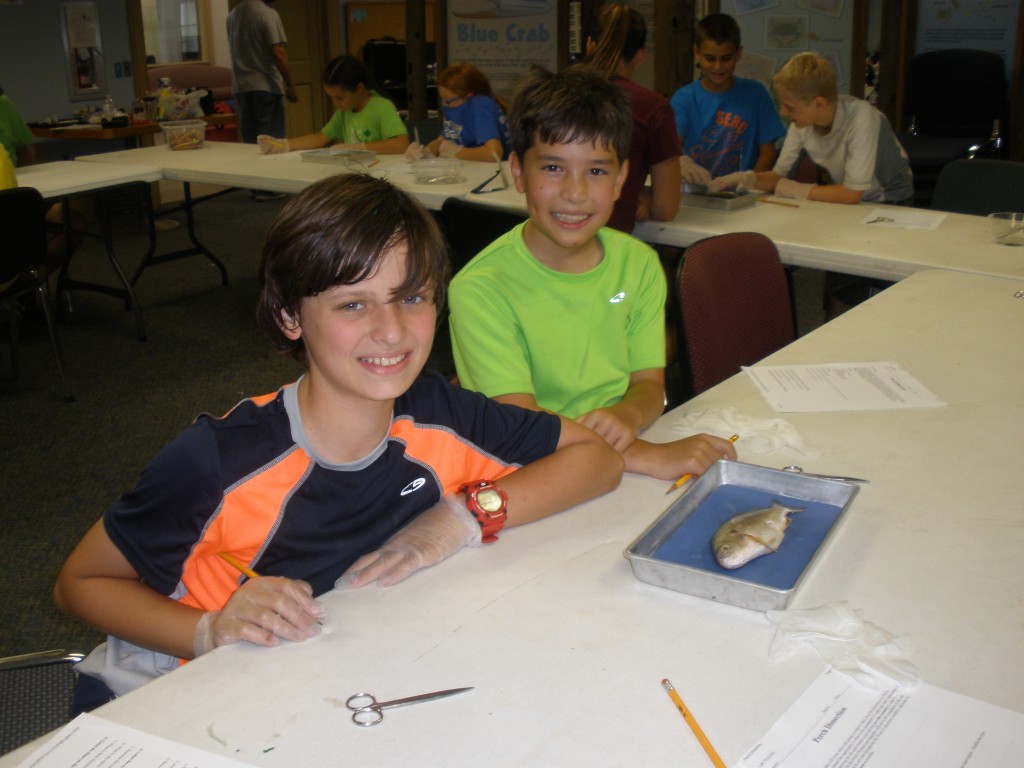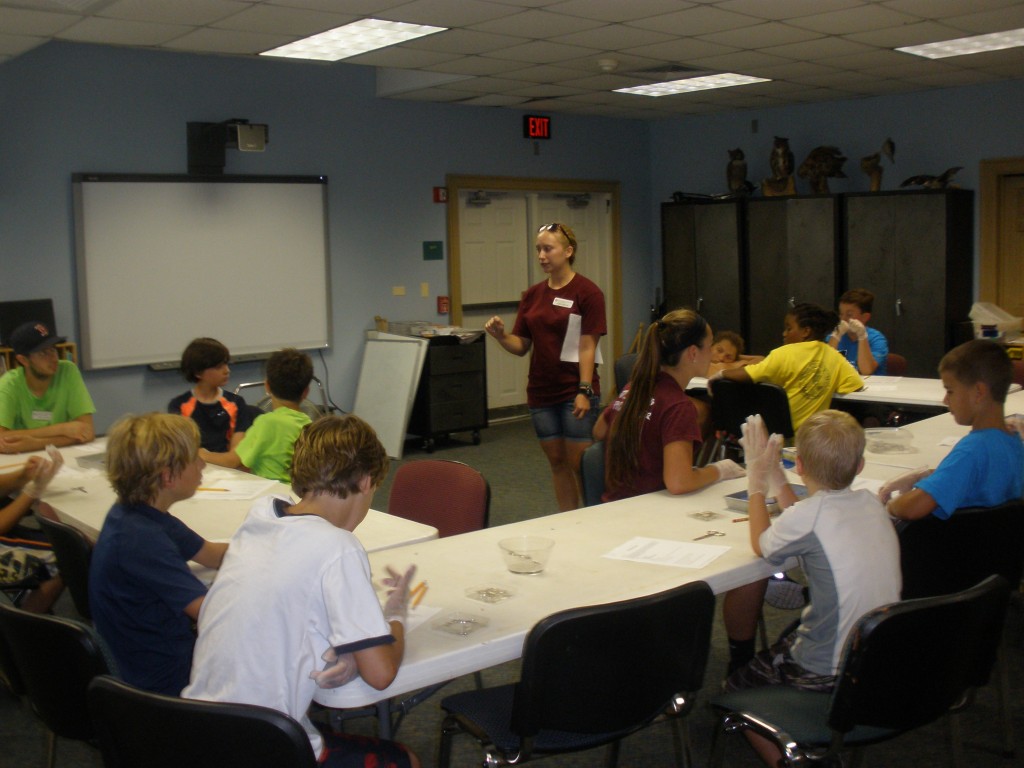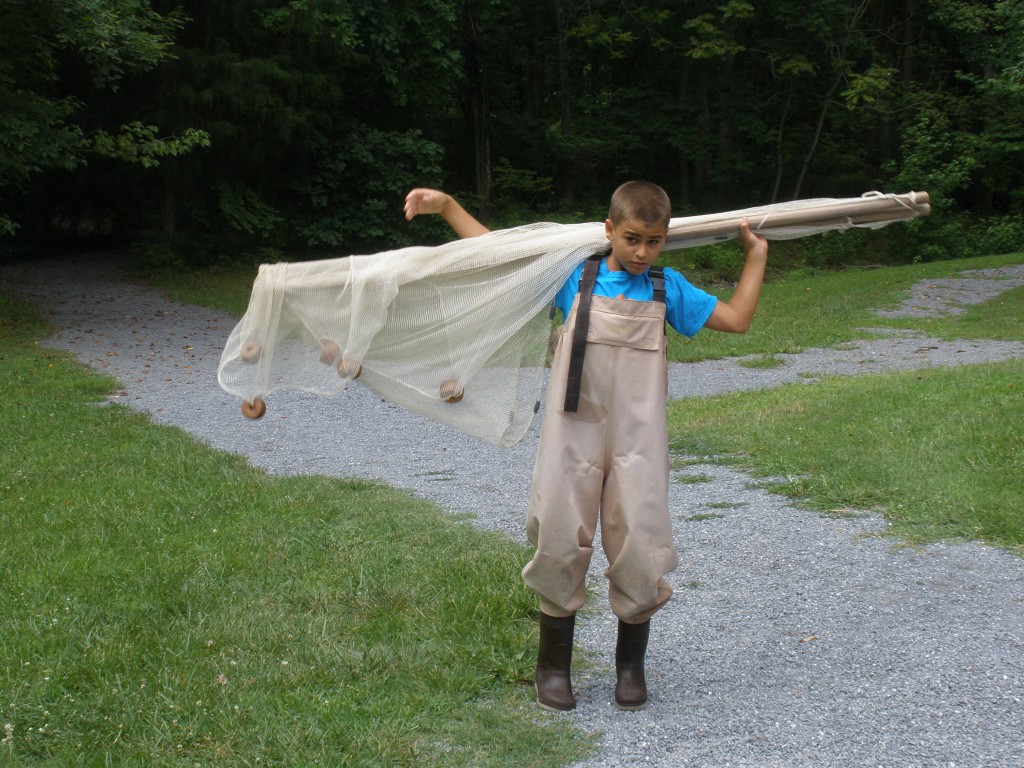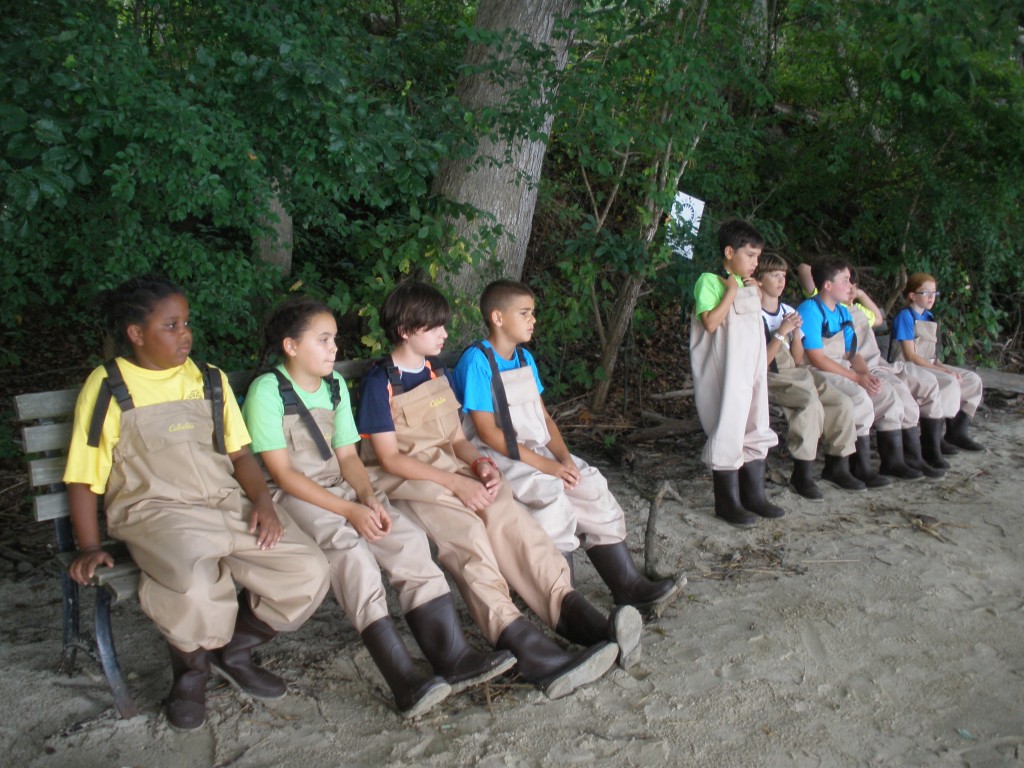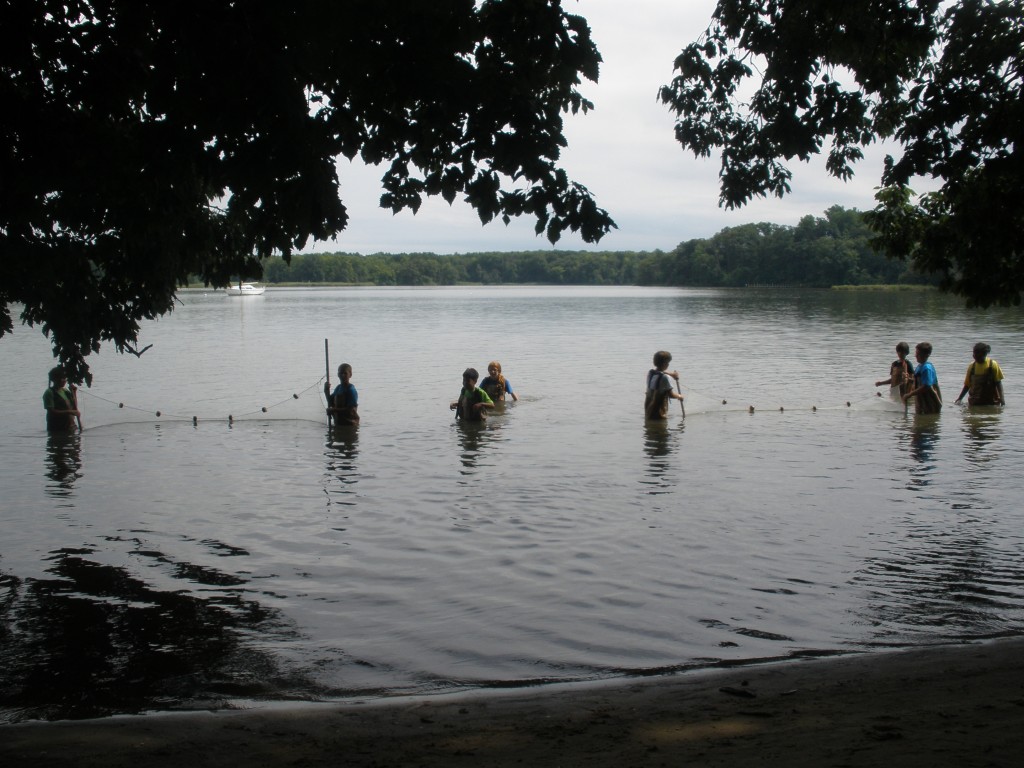By Sarah Hansen
“Hurry, hurry, hurry! Baby pipefish!” camper Jack Yee, 11, squeals as he trundles across the beach in much-too-big waders with hands cupped. A moment later the startled fish, caught by campers in a seine net, is swimming safely in a plastic tub already populated with silversides, glass shrimp, and one large pickerel.
Jack’s energy and concern for the creatures of Chesapeake Bay are exactly what SERC summer day camps are all about. The programs range from “Pollywogs” camp for prekindergarten students to this week’s offering, “Environmental Detectives” camp for rising fifth- and sixth-graders. Led by Education Department interns Anna Youngk, Lizzie DeRycke and Eric Glass, each week 12 children experience activities related to the Bay, its inhabitants, and what they can do to help.
“It gives them a deeper connection,” said DeRycke, a SERC visitor since age seven. “A lot of kids around here grow up on the Chesapeake Bay, but they don’t feel like, ‘It’s the Chesapeake Bay, I need to protect it.’ This instills that kind of loyalty.”
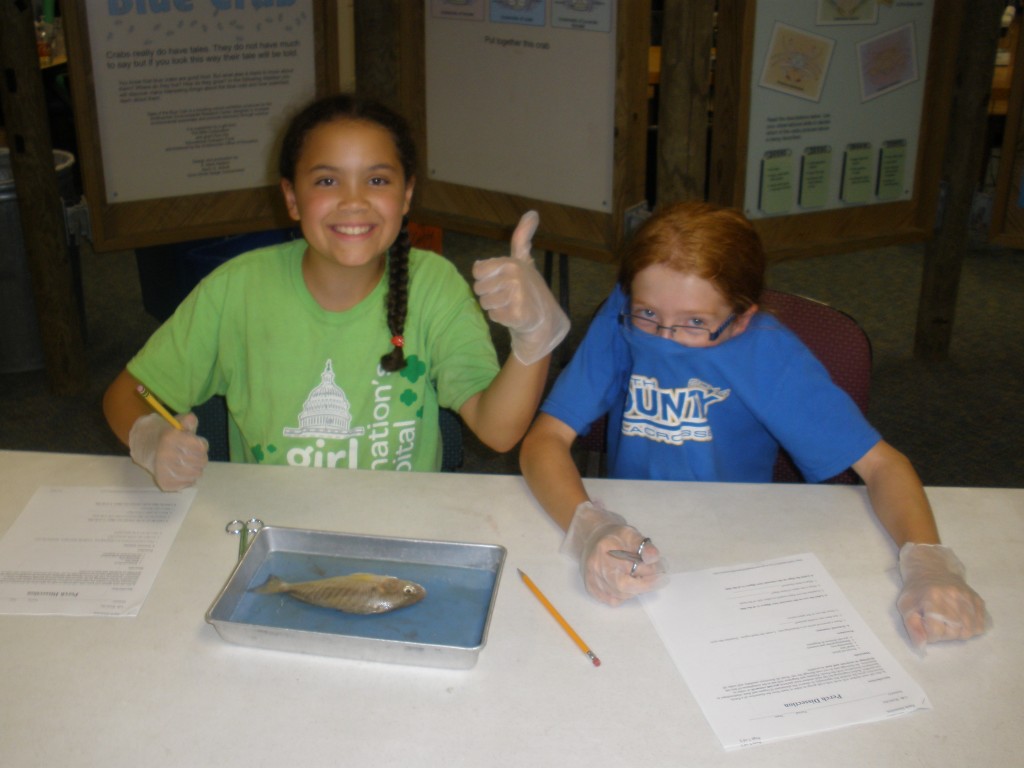
Olivia Dixon, 10 (left), and Brianna Penkala, 10, have very different reactions when it comes to dissecting a fish!
The interns and volunteer counselors-in-training lead campers through activities that help them understand the Bay region, such as building a life-size longhouse in the style of the Piscataway Indians, seasonal occupants of SERC property for thousands of years. Campers also learn the perils of limited resources in a running game where each camper pretends to be a migrating bird seeking a nesting site. Other opportunities include field trips to the National Aquarium in Baltimore, hikes on SERC trails and traditional camp games like capture the flag.
Today the campers are getting intimately familiar with one of the Bay’s fishes, perch, by performing a dissection. The kids have a wide range of feelings about cutting open a fish that looks remotely like something that could appear on their dinner plates.
“This is like a surgery. This is why I don’t want to be a doctor,” Rowan Browne, 11, said. Brianna Penkala, 10, was also nervous, but once she got going, commented that “It’s not that bad,” although her t-shirt was still pulled over her nose. But no lunches were lost and, despite some of their comments, the kids were obviously having a ball.
DeRycke directed them through the procedure, asking questions about fish anatomy along the way. She was right in tune with the age group, giving them just enough detail when discussing things like the functions of a fish’s lateral line and swim bladder.
Perhaps not surprisingly, she’s thinking about teaching middle school science after she graduates from McDaniel College in 2017. “I wasn’t going to minor in education,” DeRycke said, “but after this summer I really, really like it, so now I’m looking into minoring in it.”
Youngk is also invested in hands-on education. “That’s how you should learn. I don’t see any other way,” she said, “It gets it ingrained in your mind so much better than seeing something in a textbook or on a TV screen.” She may pursue outdoor education employment after finishing her degree in Environmental Studies at Washington College next spring.
Glass has a slightly different take. He hopes to attend graduate school and pursue environmental activism after finishing his degree in Spanish with an Environmental Studies minor at Gettysburg College. His passion for the environment brought him to SERC this summer. “Delivering that message to kids is really important, so that they get the message when they’re young and grow into that mentality of protecting the environment,” he said.
The kids have a wonderful experience at camp, and the counselors get plenty of positive feedback from parents. But this program doesn’t only benefit the campers; the interns have learned a lot, too. “I’ve learned how to capture an audience,” DeRycke said. “When you have all these kids going crazy you have to be loud and assertive and have their attention, and that can be really useful in a lot of different settings.” It will definitely come in handy in her teaching career.
Flexibility is also critical at camp. “Teamwork and flexibility should be the name of the Reed Center,” said Youngk. And what’s the worst part of camp? For Youngk, it’s not getting to see the campers again after 4 p.m. on Friday afternoon each week.
Even if Youngk will miss the children, SERC camp is a valuable, positive experience for kids and counselors alike. Many older campers have attended for several consecutive years. After seeing the smiles on the campers’ faces as they traipse out into the river with a seine net or see a fish’s gills close up for the first time, and the counselors’ warm and caring attitudes and wealth of knowledge to share, it’s no surprise.

